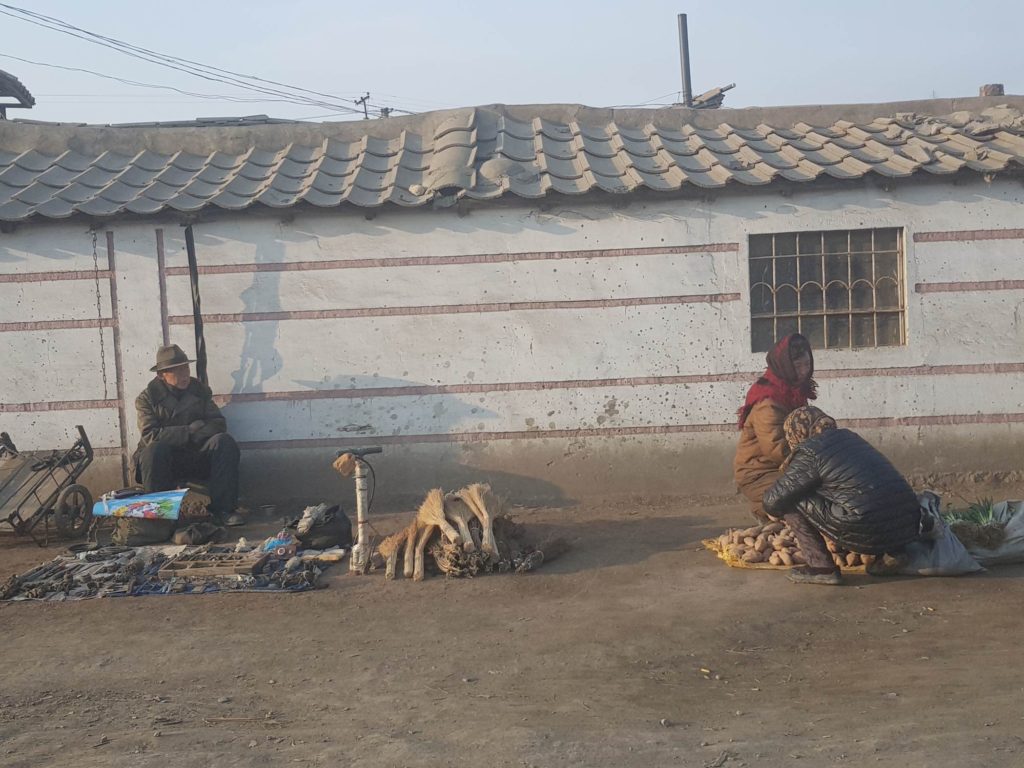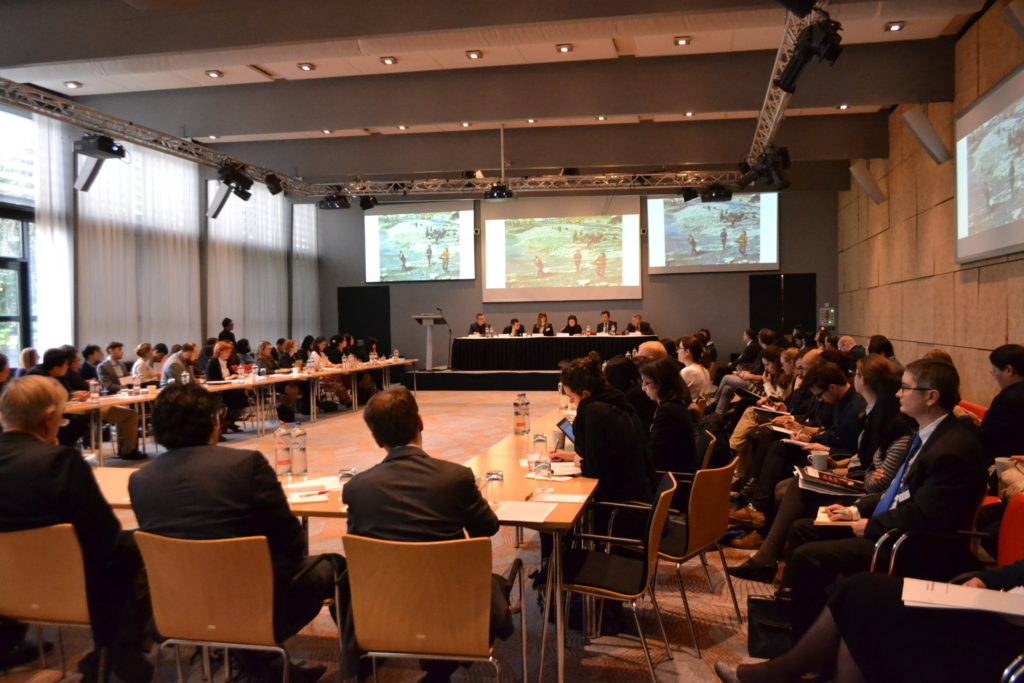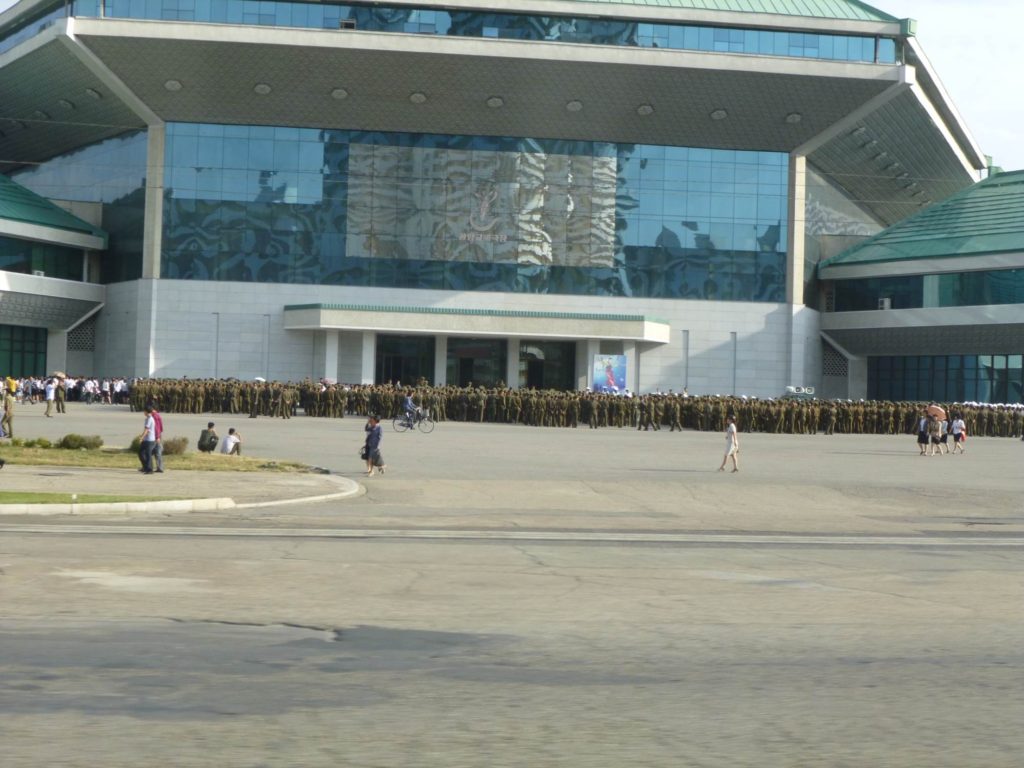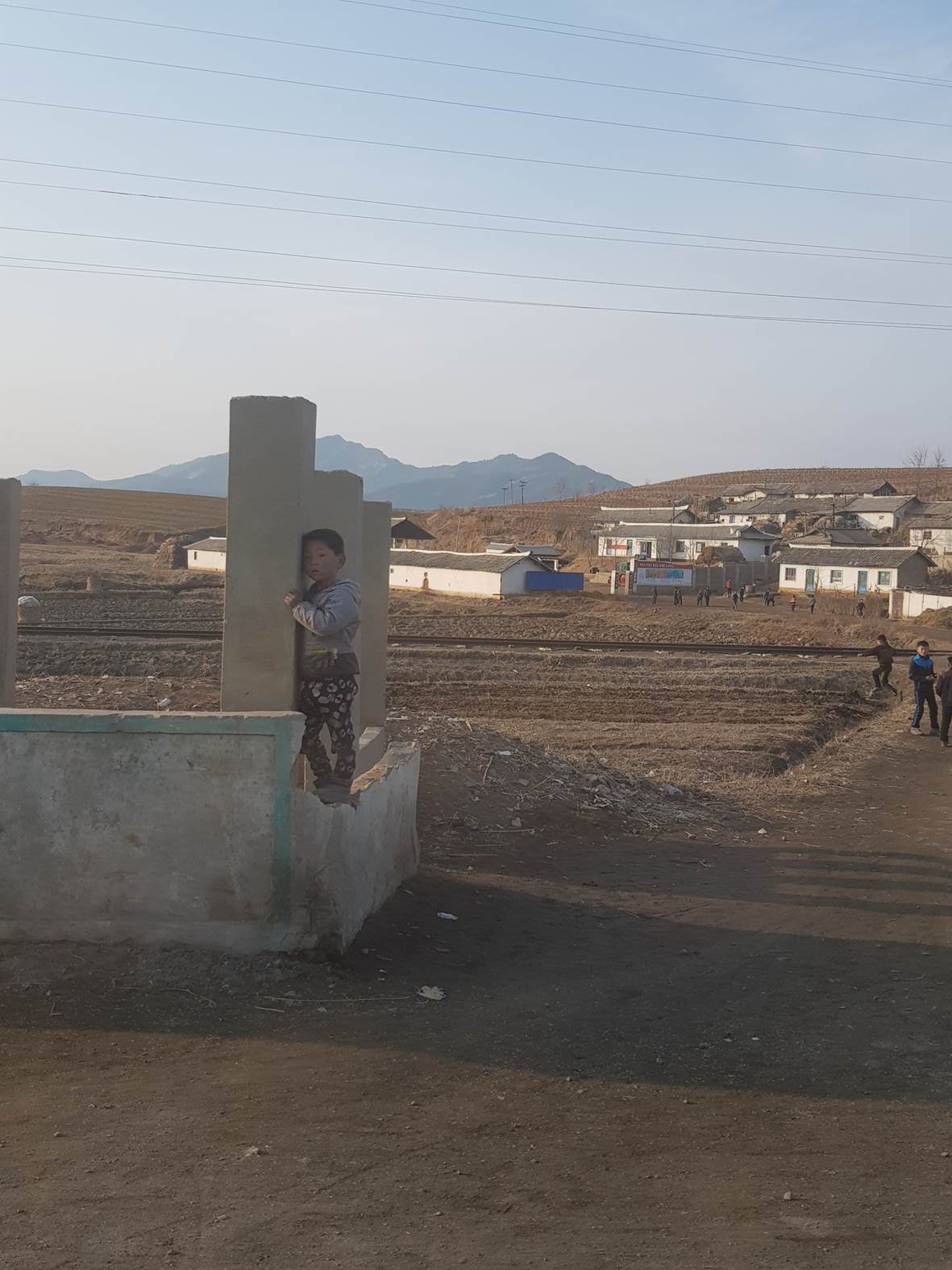Saram: A Berlin-Based NGO Dedicated to Human Rights in North Korea.
Written by William Urbanski
Saram (사람, “people” in Korean) is an NGO based in Berlin that promotes human rights in North Korea. It sounds anomalous that a German NGO would be involved in the issue of human rights under the Kim Jong-un regime, but the group, largely comprised of volunteers, has very compelling reasons to do so.
I first met Nicolai Sprekels, the founder and spokesperson of Saram, when I was working on my master’s degree in Berlin. Sprekels and his team brought two North Korean defectors to my university to speak at a human rights conference, and the stories they told of the horrible conditions within the country and of their harrowing experiences escaping the country, being captured, and escaping again, literally had the audience in tears.
Saram, an independently funded NGO, operates out of a refurbished World War II bunker, where it regularly hosts events that draw attention to the human rights atrocities that are buried in the deluge of mass media and second- or third-hand information that people usually read about North Korea. Saram also carries out international initiatives that go well beyond the platitudes expressed by the so-called pundits so regularly seen on television.
In late 2019 and early 2020, Sprekels spent a number of weeks in Seoul meeting with various interest groups and was later joined by Saram Director Franziska Gregor. I met with Sprekels and Gregor in Seoul in February to hear what they had been up to.
Gwangju News (GN): Thank you, Nicolai and Franziska, for meeting with me. To start off, what is Saram and what does it do?
Nicolai Sprekels: Saram is a team of mostly German people, mostly in Berlin. We also have a North Korean on our team, and there are a few people around the world cooperating with us. We started about six years ago and believe that people around Germany and Europe should try to improve human rights in North Korea. At first, we only sought out information about North Korea and were learning how to verify it. When Kim Jong-il died, that was the moment we decided to really get active and form an NGO. Two years ago, we changed from an NGO to a foundation. Since then we have been able to engage in a lot more dialogue with German officials and big institutions in human rights.
GN: You are based in Berlin. Why do you care what happens in North Korea, and why is it important for people in Europe to understand what is going on there?
Sprekels: There are two answers to that. First, most people here [in South Korea] are probably not aware that relations between the Democratic People’s Republic of Korea (DPRK) and the European states, particularly Germany, are quite close and stable in many ways. There is a lot of dialogue, exchange, and humanitarian aid programs. They are very complex relations, but what is important to understand is that the DPRK had partner states in Europe when Germany was still divided. East Germany supported the DPRK and helped it rebuild after the Korean War. So many people in North Korea have a very good impression of Germans. After German reunification, Germany maintained diplomatic relations, and today Germany is the only country that has an accepted, official human rights dialogue with the DPRK. For these reasons, Germany has a chance to improve human rights issues in the DPRK, but to do so we need many more people, rather than just a few politicians, to be aware of the situation and the political aspects.

Franziska Gregor: Also, a number of people who work for our foundation, myself included, are from East Germany. So, we have a closer relationship to the topic than people from other European countries because we are more familiar with the special relations that Nicolai just mentioned.
Sprekels: The second reason has to do with World War II and the road Germany took. I think everyone around the world is aware of the immense crimes committed by the Nazi Party, including the Holocaust and the murder of all kinds of unwelcome people by that regime. After the total defeat of the Nazis, a process of complete change in Germany started along with a rethinking of how to deal with regimes like that. Today, Germany is a state that feels an urgent responsibility to prevent these kinds of human rights violations. The slogan repeated by German politicians all the time is “Never Again,” which refers specifically to concentration camps.
Gregor: It is our position that Germany has a special responsibility, because of the Second World War, to prevent these kinds of situations around the world.
GN: Why is it important to not listen to so-called “experts” on North Korea, and who should people be listening to in order to get a clear picture of the situation in the DPRK?
Sprekels: If we had listened to and believed the information from European experts, we never would have started an NGO. European experts do not meet defectors and the info we got from defectors was the opposite of the statements made by the supposed experts. The reports by defectors were so shocking we hesitated to believe them at first, but the gap between the views of the European experts and the defectors was so wide we decided the only approach was to get to know defectors. We use scientifically obtained information from defectors, meaning we are closer to understanding what is really going on than the experts are. For example, we know beyond a shadow of a doubt there are over 100 thousand people living in prison camps in terrible conditions in North Korea.
Gregor: There is no free movement in North Korea. So, there is no way for experts who have visited to be sure if what they were being told [by DPRK representatives] was actually happening. Just as well, some of the German experts actually worked for the East German government. They visited the DPRK as government guests and were certainly not neutral. We are kind of like independent journalists in the sense that we try to verify defector stories.

GN: You have been extremely busy during your time in Seoul. Whom have you been meeting with?
Sprekels: Largely, I have been meeting with North Korean defectors. Let’s say it like this: It is important for the majority of defectors do not want to talk in public or speak out. Their families in North Korea might suffer because of that and could be sent to prison camps. We meet them in private and earn their trust. That is a very important part of our work here. Besides that, we have been meeting with people from NGOs such as NK Watch and ICNK (International Coalition to Stop Crimes Against Humanity in North Korea), as well as with the OHCHR (Office of the United Nations High Commissioner for Human Rights).
GN: Could you comment on the international approach to North Korea? What works and what does not? What do you think would be the most effective way to deal with the regime?
Sprekels: Generally speaking, from my understanding, among the general public in South Korean society and the political parties, there are two extreme positions for dealing with North Korea. The first is this idea of applying maximum pressure. The other side wants to build a very friendly and trustful relationship, like with the Sunshine Policy [of President Kim Dae-jung]. These two extreme approaches change every few years with the elections and North Korea plays on this quite well. They try to play around between these two possibilities. Just to be clear, we do not want to lecture the South Korean government on what to do. What we would like to have is a situation internationally where political and civil organizations (NGOs) follow one strategy to really be successful in achieving improvements for North Koreans in their daily lives and in terms of the human rights situation. Now there is no joint strategy. We are not against the exchange, but we want to have a more contingent exchange. We should not give North Korea any benefits without them improving some human rights aspects. This should always be the condition for exchange. What we see in Europe is that if one country wants to talk about human rights, North Korea will refuse to talk with them and just go to the next country. North Korea plays this perfectly. It is not because the regime is mysteriously evil, but it is just natural for them to do that.
GN: What do you have to say about people who would like to visit North Korea to “experience it for themselves” and get a direct impression?
Sprekels: The thing is, if you go to North Korea today, you do not get a realistic impression, not at all. There is no freedom of movement, and you see only what they want you to see.
Gregor: It is a guided tour, and you are funding the government. It is not a tourist institution that runs the tours. The tourist office is directly linked to the government. All the money you spend on that trip is reinvested to fund programs like the military.
The question is, do you really want to see what is going on there? My personal opinion is that if you want to go to a country to experience its poverty or human rights problems, then it is a little bit like going to a zoo. You also have to keep in mind that you cannot just walk around and approach people and talk to them, even if you do speak Korean. You would endanger people by doing that. If they say something wrong or against the government, you can leave the country, but they have to stay there and face the consequences. So, even if you think it is a good idea to smuggle something into the country or talk about your personal point of view with them, you would be endangering the people living there.
You have to ask yourself why you want to do this trip. Is it just to satisfy your curiosity, the same as you would do on a city trip to London or Paris? Or do you really want to know something about the people there? If so, it is probably better to talk to someone who has left the country. Everything you see there is completely staged for the tourists. I do not think there is a yes or no answer to the question of whether you should go there, but you should be aware of all the points before you make a decision.

GN: Getting back to the issue of the regime and how it works, you mentioned there can be no real improvements in North Korea until there is a regime change. Can you expand on that?
Sprekels: There are a lot of dictatorships in the world that have ended. Take for example the regime in Romania under Ceausescu, who actually had Kim Il-sung as his role model. We can understand the nature of dictatorships quite well. The assumption that so many people have is that all dictatorships are the same but that North Korea is different. It is not. We know very much what happens psychologically to dictators that have complete power and are admired by the population. We can predict what North Korea is going to do because we can predict how dictators mentally change. And you can see in the case of all dictators (Hitler, Stalin, Ceausescu) is that over time they get more paranoid about losing their power, and they get more brutal in their mechanisms of oppression. It doesn’t make any sense to say that the North Korean dictatorship should be an exception, and we can prove this by the actions they are doing today. So, regime change is the only thing that will end that cruel human rights situation.
I have to be clear in what I mean by regime change. I do not mean that this should be achieved through military action. There is no military option at all when it comes to North Korea. I want to make that extremely clear. It would be extremely horrifying. I do not have the answer on how to achieve such a change, but we definitely need a different approach.
If the current regime were to open up the country, the citizenry would want to have basic rights. Once this happened, the regime would be weakened. This is what we see in every other dictatorship, and this is why the current regime cannot open the country up. It is not an option, and we need to understand and accept that.
GN: Quite a profound and eye-opening viewpoint, I must say. Thank you both for sharing your views on North Korea with the Gwangju News.
Saram’s German-language website contains pictures and contact information if you’d like to learn more:
https://saram-nk.org.
THE AUTHOR
William Urbanski, the managing editor of the Gwangju News, has an MA in International Relations and Cultural Diplomacy. He is married to a wonderful Korean woman, always pays cash and keeps all his receipts.







